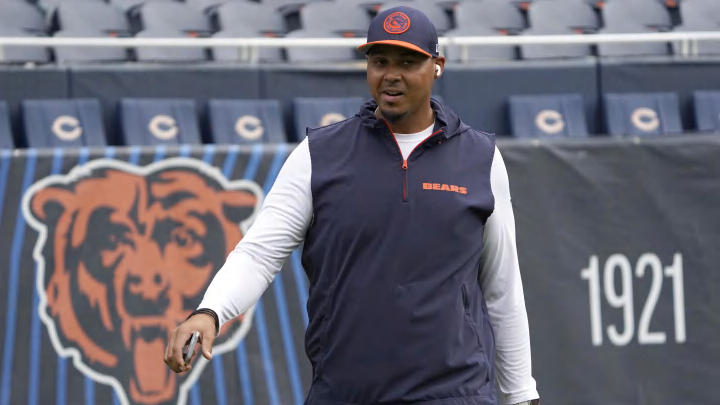Why Ryan Poles' Depth Trades Made Sense on Every Level for Bears

Two moves Ryan Poles made to solidify the greatest weaknesses facing the Bears heading into roster cuts need to be taken for what they are.
They need to be looked at through the prism of depth.
When Poles made the trade of a sixth-round pick for edge Darrell Taylor and a sixth-round pick for defensive tackle Chris Williams and a seventh-rounder, it triggered the usual storm of social media second guessers and radio call-in know-it-alls who think every trade made needs to bring in a Montez Sweat level of player.
The Bears GM believes he has a solid, winning group this year, if not better, and these moves were made for depth, especially the Williams trade.
They need at least four edge rushers to be successful keeping players fresh in a rotation, and acquiring Taylor meant they have four: Sweat, starter DeMarcus Walker, Austin Booker and Taylor.
Taylor has been a more productive edge rusher than Walker, but Walker is a better all-around player who is needed for the edge against the run but is capable of moving inside to tackle in obvious pass rushing situations in place of a nose tackle or the 3-technique. They have a starter at end and it's Walker. They needed the situational pass rusher and backup, and this is Taylor.
One big complaint about this move is the perception someone available who would have made more money would have upgraded the pass rush more. Yannick Ngakoue was the name tossed about most, but Ngakoue's play last year was abysmal according to Pro Football Focus grades. His four sacks in 13 games and extremely low pass rush win rate caused PFF to label him the next-to-worst edge rusher in the league for 2023. He lived up to a reputation for being disinterested at defending the run and the number of times he missed with sack attempts he could have closed out during the seasons' first half haunted the Bears defense. The Tampa Bay game was a blatant example of this problem.
Ryan Poles when it comes to trading draft picks for garbage time players every year pic.twitter.com/d2l2JayWMa
— Billy (@WhiteSoxCenter) August 23, 2024
They see the opposite in Taylor.
"He's got a great motor, he finishes," coach Matt Eberflus said. "Needs some refinement at the top of the rush, which we'll work on that, but he pursues and does the things, everything that everybody else does in the building that we expect and what we hold guys accountable to."
CHRIS WILLIAMS BRINGS DEPTH TO INTERIOR OF DEFENSIVE LINE
OPTIMISTIC VIEW GIVEN BY MATT EBERFLUS ON INJURY TO ZACCH PICKENS
BEAR SEE INTENSITY AS KEY ASPECT OF DARRELL TAYLOR'S PLAY
ALBERT BREER'S MAILBAG: WHERE CALEB WILLIAMS RANKS VS. OTHER NO. 1 QBS
He hustles, is what Eberflus means.
poles is a great gm but he’s the worst of the great gms if that makes sense. i mean he traded a 2nd rounder that turned into a technical first (32) for chase claypool. That pick turned into one of the best man corners itl. He’s had very high highs and very low lows.
— Minkahburgh ✝️ (@MinkahBurgh39) August 25, 2024
The cost would need to be lower and options more limited for the Bears to turn Ngakoue's way again. Nagakoue made $10.5 million last year for his four sacks, so why take another chance on that type of return when there was plenty to like at $3.1 million from Taylor?
Cap space becomes the other concern here at this late point and the $3.1 million for a player who has a history of being unable to close out on pass rush is a bargain, even if it is for only one season. It doesn't have to be one season, either. This cash paid allows the Bears one or two extra signings in case of injury over what they might have had to pay for one of the experienced free agent edge rushers available. It also lets them have potential money to devote to a contract extension for Teven Jenkins and/or Keenan Allen.
Spotrac.com has them at about $16 million available cap space after adding Taylor's cash into the mix.
Another big complaint from another angle is the Bears gave up too much because this was a player who was going to be cut.
Ryan Poles should honestly be put into football prison for his absolute annihilation of an entire franchise. Carolina is crippled for years b/c of Poles' brilliance & the #BEARS have yet ANOTHER pick next year from the trade. Moore, Williams, Wright, Taylor, Stevenson
— Chuck Satterlee (@ComicsChuck) August 21, 2024
GO BEARS! pic.twitter.com/um1eYVnZD1
It's entirely possible he would have been let go, but even at that someone who was a second-round pick and makes only $3.1 million with a history of pass rush success is going to get gobbled up on the waiver wire long before the Bears have a chance to sign him. They don't have first dibs on waivers these days. This is a team moving up and the weaker teams needing pass rushers even more than they do would most likely have signed him.
Sacrificing the future is always a popular theme among critics when any trade is made involving draft picks. Poles frequently has been criticized for giving up sixth- and seventh-round picks and he did it again. First, he had three sixth-rounders for 2025 to trade, so it's not like they needed the sixth-rounder. Also this is hardly a case of coughing up material vital for the future success of the team.
Of the 30 players drafted in Rounds 6 and 7 by four GMs since the Bears last won a playoff game, Charles Leno Jr. is the only one to become a successful long-term starter. Khalil Herbert started last year and is a backup again, but a productive player. Javon Wims might have been the next most successful, if you like 28 catches in 56 career targets and a sure playoff touchdown that went right through his hands. They drafted two punters in there, too, but that's when specialty players normally get drafted—except if they're as talented as Iowa punter Tory Taylor was.
Of the 82 players drafted in the last two rounds in 2023, only 34 made it into more than half the games and only nine, according to Pro Football Reference, started more than five games.
So getting any kind of immediate return on a sixth- or seventh-rounder is unlikely. It's usually this way and the Bears GMs who have produced few starters or major contributors in thosse rounds are no different than GMs around the league.
Of course you're going to trade away a sixth- or seventh-round pick for someone your staff identified as being worthy of playing a possible quarter to one third of the snaps with starters in a given season, especially if it's a younger player acquired.
Neither one of the players the Bears acquired is on their second contract. You want young players to develop, what's wrong with one who is in his mid-20s like the Bears acquired, but has some experience, and not one who needs to gain experience and develop even more like a rookie must?
Poles knows what he's doing trading sixth- and seventh-round picks who rarely mean much in this league, as long as he's getting back talent with a better chance of helping immediately. It's a percentage play.
There’s nothing Ryan Poles loves more than sending a sixth round pick for a bench player in the middle of August https://t.co/rJz9pAngju
— 🐻 (@CutlerToForte) August 24, 2024
After all, if the need is so great to have talent for the future, that's what next year's draft is all about.
The Bears are at point where they can compete, so solidifying all potential weaknesses takes priority over bringing along a player who is barely over practice squad level so he can play a couple special teams snaps. And that's what history says the huge majority of sixth- and seventh-rounders are, if they even make the team.
Bears 6th and 7th Rounders
Last Decade
- DT Travis Bell
- S Kendall Williamson
- S Elijah Hicks
- P Trenton Gill
- C Doug Kramer
- RB Trestan Ebner
- G Zachary Thomas
- G Ja'Tyre Carter
- RB Khalil Herbert
- WR Dazz Newsome
- CB Thomas Graham
- DT Khyiris Tonga
- OT Arlington Hambright
- OT Lachavious Simmons
- CB Duke Shelley
- RB Kerrith Whyte Jr.
- CB Stephen Denmark
- LB Kylie Fitts
- WR Javon Wims
- S DeAndre Houston-Carson
- WR Daniel Braverman
- T Tayo Fabuluje
- QB David Fales
- P Pat O'Donnell
- T Charles Leno Jr.*
- DL Cornelius Washington
- WR Marquess Wilson
- DB Isaiah Frey
- S Greg McCoy
- DB J.T. Thomas
*full-time starter
Ryan Poles in addition to The many draft picks he has hit on found Tyson Bagent, Jaylon Jones and Jack Sanborn as undrafted free agents.
— Taylor Doll (@TayDoll1010xl) August 25, 2024
All direct backups to starters who have turned out to be really solid. https://t.co/xyjSNjOosi
Twitter: BearsOnSI
